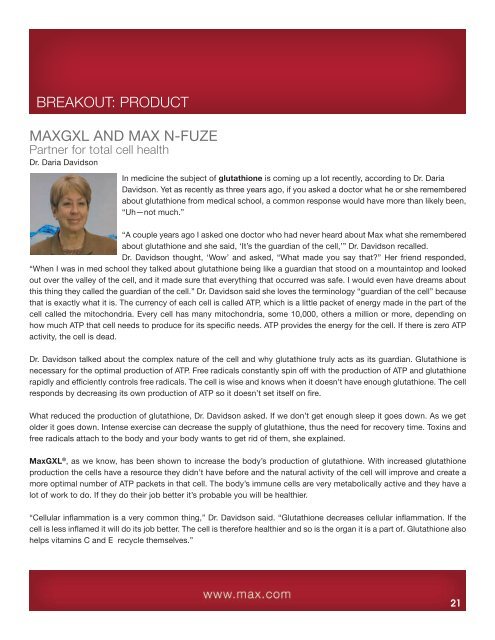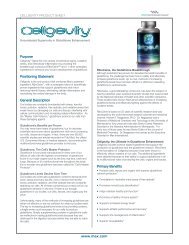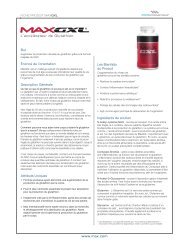Download - Max International Virtual Office
Download - Max International Virtual Office
Download - Max International Virtual Office
Create successful ePaper yourself
Turn your PDF publications into a flip-book with our unique Google optimized e-Paper software.
eakouT: ProducT<br />
MAXGXL ANd MAX N-FuzE<br />
Partner for total cell health<br />
Dr. Daria Davidson<br />
In medicine the subject of glutathione is coming up a lot recently, according to Dr. Daria<br />
Davidson. Yet as recently as three years ago, if you asked a doctor what he or she remembered<br />
about glutathione from medical school, a common response would have more than likely been,<br />
“uh—not much.”<br />
“A couple years ago I asked one doctor who had never heard about <strong>Max</strong> what she remembered<br />
about glutathione and she said, ‘It’s the guardian of the cell,’” dr. davidson recalled.<br />
dr. davidson thought, ‘Wow’ and asked, “What made you say that?” Her friend responded,<br />
“When I was in med school they talked about glutathione being like a guardian that stood on a mountaintop and looked<br />
out over the valley of the cell, and it made sure that everything that occurred was safe. I would even have dreams about<br />
this thing they called the guardian of the cell.” dr. davidson said she loves the terminology “guardian of the cell” because<br />
that is exactly what it is. The currency of each cell is called ATP, which is a little packet of energy made in the part of the<br />
cell called the mitochondria. Every cell has many mitochondria, some 10,000, others a million or more, depending on<br />
how much ATP that cell needs to produce for its specific needs. ATP provides the energy for the cell. If there is zero ATP<br />
activity, the cell is dead.<br />
Dr. Davidson talked about the complex nature of the cell and why glutathione truly acts as its guardian. Glutathione is<br />
necessary for the optimal production of ATP. Free radicals constantly spin off with the production of ATP and glutathione<br />
rapidly and efficiently controls free radicals. The cell is wise and knows when it doesn’t have enough glutathione. The cell<br />
responds by decreasing its own production of ATP so it doesn’t set itself on fire.<br />
What reduced the production of glutathione, Dr. Davidson asked. If we don’t get enough sleep it goes down. As we get<br />
older it goes down. Intense exercise can decrease the supply of glutathione, thus the need for recovery time. Toxins and<br />
free radicals attach to the body and your body wants to get rid of them, she explained.<br />
<strong>Max</strong>GXL ® , as we know, has been shown to increase the body’s production of glutathione. With increased glutathione<br />
production the cells have a resource they didn’t have before and the natural activity of the cell will improve and create a<br />
more optimal number of ATP packets in that cell. The body’s immune cells are very metabolically active and they have a<br />
lot of work to do. If they do their job better it’s probable you will be healthier.<br />
“Cellular inflammation is a very common thing,” dr. davidson said. “Glutathione decreases cellular inflammation. If the<br />
cell is less inflamed it will do its job better. The cell is therefore healthier and so is the organ it is a part of. Glutathione also<br />
helps vitamins C and E recycle themselves.”<br />
21
















